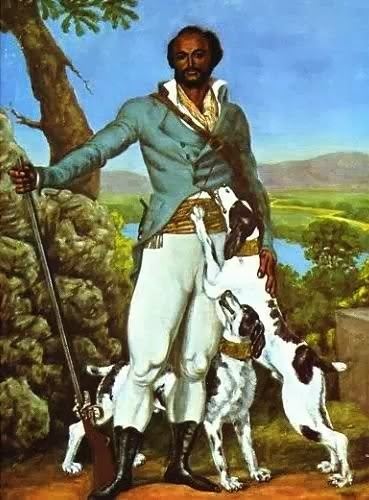|
1762 was the birth year of a man who was the son of a slave that became one of the most prominent men in French military history. Alexandre Davy de la Pailleterie was his birth name, he is the son of a white French nobleman named Alexandre-Antoine Davy, Marquis de la Pailleterie, and an enslaved black woman named Marie-Cessette Dumas; Marie-Cessette was the slave of Alexandre-Antoine. Alexander Dumas was born in Saint Dominique (Haiti) on the island of Hispaniola. At the age of fourteen, he traveled to France to join his father; Dumas was treated as a slave in his home town because he was of slave lineage, but in France, he was the son of an aristocrat and benefited from his father’s position. Alexandre Davy earned nobleman status when he became the Marquis de la Pailleterie, which was his family’s title. For the next ten years, Dumas matured into a fine young man who had no idea he would make history as a military hero. At the age of twenty-four Dumas joined the French Army, his father refused to allow him to use his family’s name because he was entering the army as a private, Alexandre-Antoine did not want to be associated with anything of low-class. Dumas then changed his name from Alexandre Davy de la Pailleterie to Alexandre Dumas, honoring his mother’s last name. Dumas joined the French Army in 1786 as a private, by 1792 he became a corporal in the Army and developed a reputation as a fierce soldier, swordsman, and leader during France’s battle against Austria and Prussia. Dumas' reputation as a great soldier was enhanced during the French Revolution. He became a member of a legendary all-black French unit named La Légion Américaine or the Black Legion, which was formed by Joseph Boulogne Chevalier de Saint-Georges in 1792. Shortly after the Black Legion was formed Dumas was promoted from corporal to second in command of the legion as the Lieutenant Colonel. Information suggests that Chevalier de Saint-Georges grew disinterested in continuing as a leader in the French army and left the Black Legion under the leadership of Dumas. The Black Legion was highly successful under Dumas, they were so successful that Dumas was promoted to General of La Légion Américaine in 1793, making him the first black person to become a general in the French Army. His rise from a private to a general was swift but well deserved, Dumas was a fighting machine with a bad temper, which was what the leaders of the French Army loved and hated about him. In 1793, as commander of the French Army located in the Alps, Dumas led the army to two vital victories capturing mountain passes. Despite his fame and success, he was ordered to defend himself legally against a Parisian Jacobian Club, coincidentally a coup d’etat occurred and he was free of those legal burdens. Around 1794, Dumas was beginning to have health problems and was granted leave time to recover. His recovery lasted two years. He returned to battle in the Alps in 1796 but was not given the command of the unit he was fighting with because he was demoted to second in command. Dumas was displeased with being demoted, he requested and was granted a transfer, he was sent to Italy to fight under the leadership of Napoleon Bonaparte. The relationship between Dumas and Bonaparte was a turbulent one, though Bonaparte respected Dumas’ resume Dumas didn’t hold the same level of respect for Bonaparte. In 1798, Bonaparte led his unit into Egypt, but they were not very successful. In addition to the unit’s lack of success Dumas’ health was beginning to decline again. Frustration with losing battles, declining health, and a rapidly declining relationship with Napoleon Bonaparte, all led to Dumas leaving Egypt in 1799. Unfortunately, Dumas found himself in a shipwreck off the coast of Italy, he was rescued but he became a prisoner of war for two years. In 1801, he was released from prison, but his health was also still in decline, so he decided to settle in the city of Villier-Cotterêts with his family. In 1802, he and his wife birthed a boy who would become a literary titan, Alexandre Dumas. Dumas died in 1806 at the age of forty-four having accomplished so much in such a short time that his life became a story. His son Alexander Dumas became the legendary author of popular books such as The Three Musketeers and The Count of Monte Cristo, which we later learned were based on the life of his father. Alexandre Davy de la Pailleterie, aka Alexandre Dumas, we stand on your shoulders. J.A. Ward Click here to learn more about the On the Shoulders of Giants book series!!! References:
https://www.britannica.com/biography/Alexandre-Dumas-French-general https://originalpeople.org/thomas-alexandre-dumas/ https://www.bl.uk/onlinegallery/features/blackeuro/dumasfather.html https://www.blackpast.org/global-african-history/people-global-african-history/dumas-thomas-alexandre-1762-1806/
1 Comment
|
Details
Categories
All
Click Here to join our mailing list
|
Contact Us: |
Connect With Us |
Site powered by PIT Web Design



 RSS Feed
RSS Feed



